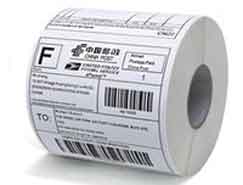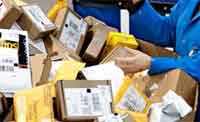| |
|
| |
|
 |
Supply
Chain by the Numbers |
| |
|
| |
- Jan. 11, 2017 -
|
| |
|
| |
|
| |
|
| |
Fake Goods are the Bane of eCommerce; Cool New Tool to Track Chinese Textile Pollution; Direct Thermal Bar Code Label Prices Headed Higher; Chinese Company being Prosecuted for IP Theft |
| |
|
| |
| |
| |
$54,715 |
 |
That was the retail value if they were authentic of some 400 pairs of counterfeit Nike athletic shoes seized this week at Dulles International Airport near Washington DC. The sneakers arrived from China in seven parcels Dec. 15 and were headed for an address in Alexandria, Virginia, according to the US Customs and Border Protection. CBP officers suspected the sneakers were counterfeit. Nike then verified the sneakers as fakes, and CBP completed the seizure Jan. 2, as counterfeit goods continue to be a huge problem for Western brand companies – and a major issue in ecommerce especially. Last month, for example, global footwear brand Skechers filed a case against on-line marketplace Flipkart and four sellers on its platform for fake goods being sold under its label in India. In December, Birkenstock CEO Oliver Reicher slammed Amazon for failing to crack down on the sale of counterfeit goods on its site. "The truth is that Amazon makes money with these fakes," Reichert told German newspaper Spiegel News Weekly. "As far we’re concerned, Amazon is an accomplice." |
|
|
| |
| |
|
|

|
That's about how much major providers of direct thermal labels for bar coding – the type that use a heat-sensitive paper to produce bar codes, human readable and other information – are raising prices here in early 2018. Why? The primary driver of the cost push is the shortage of thermal paper – all because Chinese authorities temporarily shut down a leading supplier of dye. As reported on a blog from the analysts at VDC Research, in September the Chinese government authorities closed down a factory of a company called Connect Chemicals, the world’s largest supplier of leuco dye, a vital ingredient to producing direct thermal paper stock. The factory was closed to force it to modify operations to be in compliance with environmental regulations. Given that Connect Chemicals has a global market share of the dye of 30-40%, direct thermal paper mills have been constrained and slowed or in some cases even stopped production, leading to a shortage of supply in the marketplace. So with simple supply and demand, prices are heading much higher. Budget accordingly. |
| |
| |
|
| |
| |
$800 Million |
 |
That’s is the amount by which US wind turbine controls maker American Superconducor Corp. (now AMSC) was allegedly damaged by the theft of its intellectual property by one of its customers, Chinese company Sinovel Wind Group. The US government is pressing charges against the company and two of its executives, with the trial starting this week in Wisconsin, with one federal prosecutor calling it "nothing short of attempted corporate homicide." Sinovel was a customer of AMSC, but then in 2011 suddenly stopped accepting orders for AMSC's electronic control systems for turbines. That led to a huge drop in AMSC’s market cap, but later company officials found an imperfect replica of its controls system on a Sinovel turbine. Investigation eventually led to an AMSC employee in Austria, who it is alleged shared the trade secrets with Sino level executives for $1.7 million. This in the context of an on-going federal government investigation as to whether China is systematically stealing IP from US companies by a variety of tactics.
|
| |
| |
|
|
|
| |
 |
 |
| |
|
|
| |